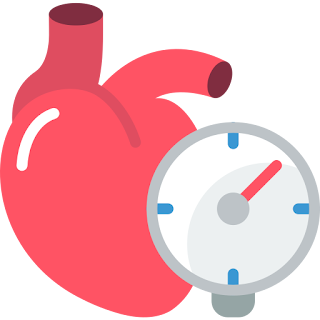Understanding Hypertension: Diagnosis, Risks, and Management
Hypertension, commonly known as high blood pressure, is a chronic medical condition characterized by elevated pressure in the arteries. It's a significant risk factor for various cardiovascular diseases, including heart attack, stroke, and heart failure. In this comprehensive blog post, we will delve into the diagnosis of hypertension, explore its associated risks, and discuss strategies for its management.
Understanding Hypertension:
Blood pressure is the force of blood against the walls of arteries as the heart pumps it around the body. It's measured in millimeters of mercury (mmHg) and recorded as two numbers:
Systolic Pressure: The top number, representing the pressure in the arteries when the heart beats.
Diastolic Pressure: The bottom number, representing the pressure in the arteries when the heart rests between beats.
Normal blood pressure is typically defined as less than 120/80 mmHg. Hypertension is diagnosed when blood pressure consistently measures 130/80 mmHg or higher.
Diagnosis of Hypertension:
Diagnosing hypertension involves several steps, including:
Blood Pressure Measurement: Blood pressure is measured using a sphygmomanometer, a device consisting of an inflatable cuff wrapped around the upper arm and a pressure gauge. The measurement can be performed at home using a digital blood pressure monitor or at a healthcare provider's office.
Multiple Readings: A diagnosis of hypertension is not made based on a single reading. Multiple blood pressure measurements taken at different times and settings are necessary to confirm the diagnosis.
Classification: Based on the average of multiple readings, hypertension can be classified into different stages:
Stage 1 Hypertension: Systolic pressure ranging from 130 to 139 mmHg or diastolic pressure ranging from 80 to 89 mmHg.
Stage 2 Hypertension: Systolic pressure of 140 mmHg or higher or diastolic pressure of 90 mmHg or higher.
Additional Tests: In some cases, additional tests may be recommended to assess the extent of organ damage or identify underlying causes of hypertension. These tests may include blood tests, urine tests, electrocardiogram (ECG), echocardiogram, or other imaging studies.
Risks Associated with Hypertension:
Hypertension is often referred to as the "silent killer" because it typically doesn't cause noticeable symptoms until it has already caused significant damage to the heart, blood vessels, kidneys, or other organs. The risks associated with hypertension include:
Cardiovascular Disease: Hypertension increases the risk of developing heart disease, including heart attack, heart failure, and coronary artery disease.
Stroke: High blood pressure is a leading cause of stroke, which occurs when the blood supply to the brain is disrupted, either due to a blockage (ischemic stroke) or a ruptured blood vessel (hemorrhagic stroke).
Kidney Damage: Chronic hypertension can damage the kidneys over time, leading to kidney failure or chronic kidney disease.
Vision Loss: Hypertension can cause damage to the blood vessels in the eyes, increasing the risk of vision problems or even blindness.
Peripheral Artery Disease: Narrowing of the arteries due to hypertension can reduce blood flow to the limbs, leading to peripheral artery disease and an increased risk of infections, ulcers, and amputation.
Management of Hypertension:
Managing hypertension involves a combination of lifestyle modifications and, in some cases, medication. Here are some strategies for managing hypertension effectively:
Healthy Diet: Adopting a diet rich in fruits, vegetables, whole grains, lean proteins, and healthy fats can help lower blood pressure. The DASH (Dietary Approaches to Stop Hypertension) diet, in particular, has been shown to be effective in reducing blood pressure.
Regular Exercise: Engaging in regular physical activity, such as brisk walking, swimming, cycling, or jogging, can help lower blood pressure and improve overall cardiovascular health.
Weight Management: Maintaining a healthy weight through a combination of diet and exercise is essential for managing hypertension. Losing even a small amount of weight can lead to significant reductions in blood pressure.
Limiting Sodium Intake: Reducing the amount of salt in the diet can help lower blood pressure, as excess sodium can cause fluid retention and increase blood volume.
Moderating Alcohol Consumption: Drinking alcohol in moderation, or preferably abstaining altogether, can help lower blood pressure. Excessive alcohol consumption can raise blood pressure and interfere with the effectiveness of antihypertensive medications.
Quitting Smoking: Smoking tobacco products increases blood pressure and damages blood vessels, significantly increasing the risk of heart disease and stroke. Quitting smoking is essential for managing hypertension and reducing cardiovascular risk.
Medication: In some cases, lifestyle modifications may not be sufficient to control blood pressure, and medication may be necessary. There are several classes of antihypertensive medications available, including diuretics, beta-blockers, ACE inhibitors, angiotensin II receptor blockers (ARBs), calcium channel blockers, and others. The choice of medication depends on individual factors such as age, overall health, and presence of other medical conditions.
Conclusion:
Hypertension is a common and serious medical condition that requires careful monitoring and management to reduce the risk of complications. By understanding the diagnosis of hypertension, its associated risks, and effective management strategies, individuals can take proactive steps to control their blood pressure and maintain overall cardiovascular health. If you have concerns about your blood pressure or are at risk for hypertension, it's essential to consult with a healthcare professional for proper evaluation and personalized treatment recommendations.
With this information, individuals can empower themselves to make informed decisions about their health and take the necessary steps to prevent and manage hypertension effectively. By prioritizing lifestyle modifications, adhering to medication regimens as prescribed, and attending regular medical check-ups, individuals can significantly reduce their risk of cardiovascular events and enjoy a healthier, more fulfilling life.
#HypertensionAwareness
#HighBloodPressure
#HeartHealth
#BloodPressureManagement
#HealthyLifestyle
#CardiovascularHealth
#PreventHypertension
#LifestyleMedicine
#HealthyHeart
#BeatHypertension




Comments
Post a Comment